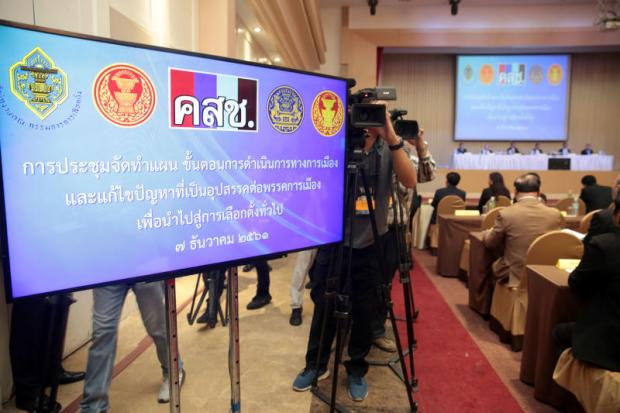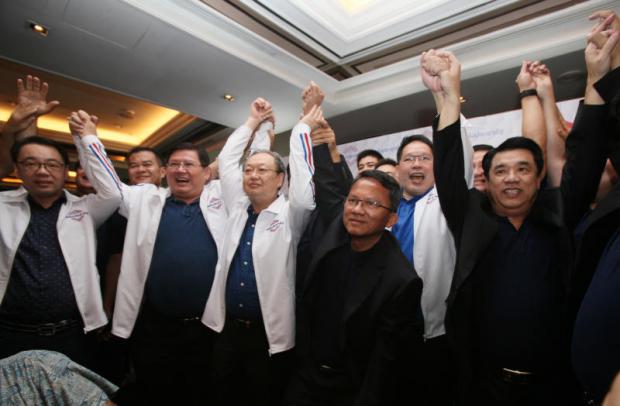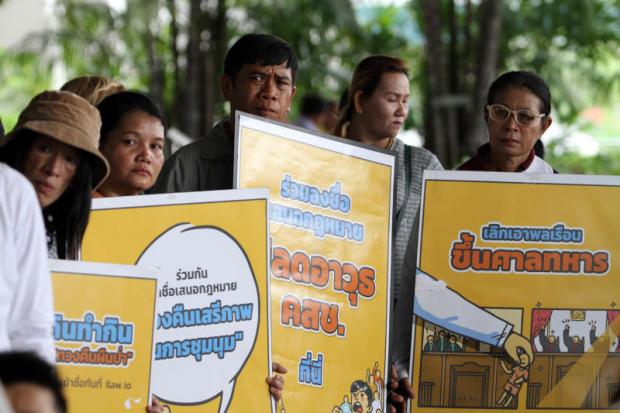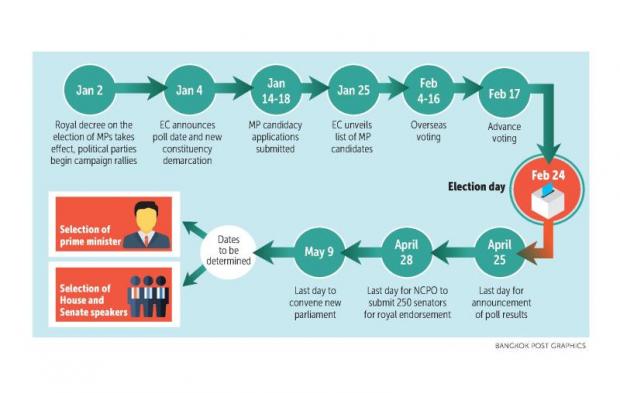The drum rolled as political parties lost no time preparing to campaign for the much-anticipated election, which has been confirmed for Feb 24 despite previously deep-seated doubts about when it would be held. Parties, however, insisted that there was no level playing field given the rise of the pro-regime Palang Pracharath Party (PPRP), which has been attacked for gaining an unfair political advantage with its top executives concurrently holding ministerial posts.

Members of political parties, the Election Commission, the National Council for Peace and Order, and more than 70 parties met on Dec 7 to prepare for the Feb 24 election at the Army Club in Bangkok. However, major parties such as Pheu Thai and Democrats boycotted the event, arguing they were invited merely to 'listen' to guidelines for holding the poll instead of debating problems that may arise during the election. Chanat Katanyu
Although the political activities ban, in place since the May 2014 coup, has finally been lifted by the regime, major parties are expected to find it hard to put up a strong showing in the party-list election system in light of the new rules which are speculated to favour small and medium-sized parties. The rules, for the most part, may well be instrumental in returning Prime Minister Prayut Chan-o-cha to the premiership after the election.
1 Feb 24 confirmed as the poll date
After party registrations under the new rules were finished, the National Council for Peace and Order (NCPO) met parties to discuss pre-election preparations at the Army Club on Vibhavadi Rangsit Road on Dec 7.
The meeting was chaired by Prime Minister Prayut.
The highlight of the meeting was the confirmation of Feb 24 as the election date.
At the meeting, Deputy Prime Minister Wissanu Krea-ngam also spelled out the election time frame, saying the NCPO would lift the ban on political activities by the end of December, allowing parties to resume activities necessary to prepare for the Feb 24 poll. The ban has since been lifted.
However, election campaigning will not be allowed until Jan 2 when a royal decree calling for that poll date is published in the Royal Gazette, he said.
On Jan 4, the EC will formally announce the official poll date and the new demarcation of poll constituencies, according to Mr Wissanu.
This is due to be followed by election candidacy applications, which will be open during the period Jan 14-18. Parties will have to submit lists of up to three prime ministerial candidates to the EC during this period.
The EC will then announce the lists of candidates contesting the constituency system and party-list candidates on Jan 25. Overseas voting will be held on Feb 4-16 and advance voting will take place on Feb 17.
April 25 will be the last day for the announcement of poll results and April 28 the last day for the NCPO to finalise the list of 250 appointed senators before submitting it for royal endorsement.
Under the constitution, parliament will convene its first meeting within 15 days of the poll results being announced, or May 9 at the latest, Mr Wissanu said.
The meeting will select the House speaker and Senate speaker, which will be followed by the process to nominate a new prime minister. The NCPO will officially step down from power when the new cabinet is sworn in, he said.

Two Sam Mitr group co-leaders, Suriya Juangroongruangkit and Somsak Thepsuthin (both in black suits), formally join the Palang Pracharath Party at its general meeting in November. Apichit Jinakul
2 The rise of Palang Pracharath
The emergence of the Palang Pracharath Party (PPRP) has reshaped the political scene ahead of the Feb 24 election as many politicians have left their parties en masse to join the pro-regime party.
The PPRP has made it clear that it would support Gen Prayut reclaiming the premiership after the poll, should he desire.
The PPRP consists of four cabinet ministers who concurrently occupy the seats of party executives.
Industry Minister Uttama Savanayana serves as its leader, Science and Technology Minister Suvit Maesincee as deputy leader, Commerce Minister Sontirat Sontijirawong as its secretary-general, while PM's Office Minister Kobsak Pootrakool is the party spokesman.
The PPRP's registration was endorsed by the Election Commission on Nov 7.
But several months before the party was established, a group of politicians calling itself "Sam Mitr" (Three Allies) had been manoeuvring to persuade politicians to defect from their parties and join the PPRP.
The group comprises veteran politicians including former transport minister Suriya Juangroongruangkit and former industry minister Somsak Thepsuthin.
The Sam Mitr group, seen as the regime's recruiting arm, was believed to have worked to secure a political support base for the PPRP by courting several former MPs from other parties to join the PPRP, according to observers.
The Pheu Thai Party appears to have been hit hardest by defections, with about 70 politicians migrating to other parties. Most of them have defected to the PPRP.
The Democrat Party has also seen about 20 politicians leave the party and many of them have joined the PPRP.
High-profile politicians who migrated to the PPRP include Mr Suriya, Mr Somsak, former Pheu Thai heavyweight Santi Prompat, former Pheu Thai MP for Ubon Ratchathani Supol Fongngam, former Pheu Thai MP for Loei Preecha Rengsomboonsuk, veteran Bhumjathai politician Suchart Tancharoen, as well as former Democrat MPs for Bangkok Nataphol Teepsuwan and Buddhipongse Punnakanta.

Members of the 'We Walk' activist group make their way to the government complex in Bangkok in August as they demand the regime revoke its ban on public gatherings of more than five people. Apichart Jinakul
3 Ban on political activities lifted
Four days after the pre-election dialogue with parties, the NCPO finally lifted the ban on political activities on Dec 11 when the law governing the election of MPs, which was earlier published in the Royal Gazette, took effect.
Gen Prayut, in his capacity as NCPO chief, issued Order No.22/2018 lifting nine orders and announcements that had prohibited political activities, including gatherings of five people and more.
However, the lifting of the ban will have no bearing on the prosecution of earlier violators of the ban, according to the order.
The order also mandated a lift on a freeze which had been imposed on financial transactions and bank accounts belonging to some anti-coup politicians and activists since the regime seized power in the 2014 coup.
They include Chaturon Chaisang, chairman of the Thai Raksa Chart Party's strategy committee; Sombat Boonngam-anong, leader of the newly-registered Krian Party, which translates as "The Firebrands' Party"; and former Pheu Thai MP and red-shirt activist Prasit Chaisrisa.
A ban on some 18 politicians leaving the country without permission has also been reversed.
An NCPO order on the allocation of financial support to parties by the Fund for Development of Political Parties, and the use of electronic media to communicate with party members, has also been lifted.
The order raises the prospect of a return of the street rallies that defined much of the turbulent period of Thai politics before the 2014 coup. However, laws already in place stipulate that police will need to be informed of any political gatherings 24 hours in advance.

Khunying Sudarat Keyuraphan, chairwoman of the Pheu Thai Party's strategic committee, addresses members, briefs them on preparations for the poll, and issues directions for the party's campaign rally. Tawatchai Kemgumnerd
4 New rules favour return of Prayut
Under the new constitution, the first batch of 250 senators who are appointed by the NCPO will serve for a so-called five-year transitional period after next year's poll.
During this five-year period, the regime-appointed Senate will be allowed to join the House to vote for a prime minister from lists of prime ministerial candidates submitted by parties, according to Section 272 of the charter.
This means the Senate can join the lower House in choosing a prime minister twice during the period -- the first time after next year's poll and the second time when the post-election government completes its four-year term and the new government takes office.
The procedure could, in theory, pave the way for Gen Prayut to stay in power for another eight years after the election, observers said.
Under the new charter, there are 500 elected MPs and 250 appointed senators.
A successful candidate for the post of prime minister needs the support of more than half of both houses or at least 376.
In light of this, the 250 appointed senators are a force to be reckoned with and will play a crucial role in keeping Gen Prayut in power.
And no matter how many times the House is dissolved during the five-year period, the 250 senators will remain and join the lower House in voting for a prime minister.
The new constitution also stipulates a mixed-member proportional representation voting system and the use of a single ballot for both constituency and party-list MPs.
This could cause major parties, particularly Pheu Thai, to win fewer House seats. Pheu Thai could see its hope of grabbing a parliamentary majority and forming a single-party government dashed.
Critics say the new system will benefit small and medium-sized parties and could lead to smaller parties capturing more party list MPs at the expense of major parties.
Under the new voting system, it is unlikely that any one single party would be able to obtain an absolute majority to form a government.
At the next election, every vote will count. The more votes a party wins in the constituency system, the fewer votes it will get in the party-list system.
In light of this, Pheu Thai, as a major party, has come up with a strategy which involves the party splitting into offshoots to gain party-list votes.
The newly-established Thai Raksa Chart is known to be a Pheu Thai offshoot to secure party-list votes.
The total number of MPs will be capped at 500, of which 350 are elected from constituencies and 150 from the party lists, which will be proportionally allocated to each party based on the number of votes from constituencies.
However, in this election, the votes cast for losing constituency candidates will be re-allocated to calculate the number of party-list seats, rather than being thrown away under the old first-past-the-post system.
Candidates who win the most votes in each constituency will still automatically become members of parliament, while the parties of unsuccessful candidates have the chance of securing a party-list seat in parliament.
As the new electoral method means Pheu Thai might not capture any party-list seats, it will need allies to collect these valuable "loser votes" that will translate into party-list seats.

Prime Minister Prayut Chan-o-cha has received support for a potential bid to reclaim the premiership. Patipat Janthong
5 Prayut, a full-time politician is born
During his visit with cabinet ministers to the northeastern province of Bung Kan on Dec 12, Gen Prayut admitted he is now a full-time politician, hinting once again that he may be ready to return to the post of premier after the Feb 24 poll, provided he is nominated by a party.
"I am here today. If I tell you that I am not a full-time politician, that's not true because I have been running the country,'' Gen Prayut said.
Earlier this year, Gen Prayut declared for the first time since he seized power in 2014 with a bloodless coup that he is a politician, though he also reminded people he is "a politician who used to be a soldier".
Gen Prayut also hinted that the PPRP may be his preferred party choice if he decides to become a prime ministerial candidate after the next poll.
He said he would naturally support any party with policies in line with those of the current regime.
Science and Technology Minister Suvit Maesincee, who concurrently serves as PPRP deputy leader, said it was time to invite Gen Prayut to become the prime ministerial candidate on its ticket after the political ban was lifted.
Somsak Thepsuthin, who is in charge of the PPRP's election campaign, said the party was ready to deal with criticism that it will help Gen Prayut cling on to power if and when the party nominates him as its prime ministerial candidate on its party ticket.
Mr Somsak said that certain parties have already raised this issue to attack the PPRP rather than focusing on presenting their policies to the public -- a move which he described as "not constructive''.

